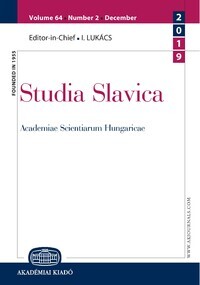Код пам’яті в сучасному українському романі
The Code of Memory in Modern Ukrainian Novels
Author(s): Lidiia Ivanivna Kavun, Oksana Volodymyrivna VertyporokhSubject(s): Ukrainian Literature
Published by: Akadémiai Kiadó
Keywords: literature; memory; symbols; culture code; creativity; sign; semantics; reflection
Summary/Abstract: The paper explores the problem of memory in the context of the artistic discourse of Ukrainian literature at the turn of the 20th and 21st centuries. The novels by Vasyl Shklyar, Volodymyr Lys, Lina Kostenko, Evgeny Pashkovsky, Tanya Malyarchuk, Sofia Andrukhovych, and others contain the cultural code as a means of transmitting information that has historically been accumulated here in the form of signs and symbols. In modern Ukrainian literature, we observe the reconstruction of cultural space on the basis of the assimilation, storage, and recoding of signs of collective and individual memory. Here, history and modernity are intertwined, the authors make an attempt to unite individual and collective Ukrainian, historical authenticity and artistic invention; the heroes come to rethink their past and their identity. In particular, Evgeny Pashkovsky’s texts Wolf Star (1991) and Abyss (1992) are analyzed, in which the autonomous code of (creative) memory reveals itself. It is about the fundamental problems of Ukrainian history, culture, and collective identity, operating on which the writer creates a “new memory”. Memory and history, where memory reflects the individual personal experience of specific historical events, is reproduced in the work by Vasyl Shklyar The Black Crow (2009). Volodymyr Lys addresses the life of an individual against the background of Ukrainian history during the First and Second World Wars, collectivization, “flourishing” and levelling of socialism, and the decline of the countryside in the first years of Independence. These themes are presented in the novel Jacob’s Century (2010). Lina Kostenko dedicates the work Notes of the Ukrainian Madman (2011) to overcoming the communicative gap between family members, between Ukraine and the world at the beginning of the 21st century. Tanya Malyarchuk talks about traumatic experience, forgetfulness, and recollection in Oblivion (2016). The Kapranov Brothers conceptualize the image of memory in the novel Forget the River (2016), which is related to the analysis of the problems of guilt and redemption, living in the past, eradicating life, etc. The cultural and mental division of the Ukrainian family and overcoming the gap between eastern and western Ukraine, connecting different people into one community became the subject of Sofia Andrukhovych’s artistic comprehension in the novel Amadoka (2020). The semantics of memory is related to the assimilation, storage, and recoding of signs (symbols, images, allusions, and quotations) of the cultural code, which accumulates and transmits information through historical experience.
Journal: Studia Slavica Academiae Scientiarum Hungaricae
- Issue Year: 66/2021
- Issue No: 1
- Page Range: 67-79
- Page Count: 13
- Language: Ukrainian
- Content File-PDF

